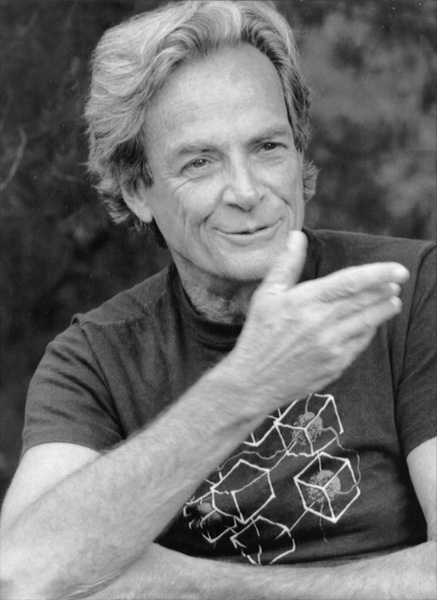From Open Culture, here are three films (and a television series) about the brilliant, charmingly eccentric, Nobel Prize winning physicist Richard Feynman. Here is some background on the man from Wikipedia:
Richard Phillips Feynman (May 11, 1918 – February 15, 1988) was an American theoretical physicist known for his work in the path integral formulation of quantum mechanics, the theory of quantum electrodynamics, and the physics of the superfluidity of supercooled liquid helium, as well as in particle physics (he proposed the parton model). For his contributions to the development of quantum electrodynamics, Feynman, jointly with Julian Schwinger and Sin-Itiro Tomonaga, received the Nobel Prize in Physics in 1965. He developed a widely used pictorial representation scheme for the mathematical expressions governing the behavior of subatomic particles, which later became known as Feynman diagrams. During his lifetime, Feynman became one of the best-known scientists in the world. In a 1999 poll of 130 leading physicists worldwide by the British journal Physics World he was ranked as one of the ten greatest physicists of all time.[3]Enjoy the videos.
He assisted in the development of the atomic bomb and was a member of the panel that investigated the Space Shuttle Challenger disaster. In addition to his work in theoretical physics, Feynman has been credited with pioneering the field of quantum computing,[4][5] and introducing the concept of nanotechnology.[6] He held the Richard Chace Tolman professorship in theoretical physics at the California Institute of Technology.
Feynman was a keen popularizer of physics through both books and lectures, notably a 1959 talk on top-down nanotechnology called, There's Plenty of Room at the Bottom, and the three volume publication of his undergraduate lectures, The Feynman Lectures on Physics. Feynman also became known through his semi-autobiographical books, Surely You're Joking, Mr. Feynman!and What Do You Care What Other People Think?, and books written about him, such as Tuva or Bust!.
The Richard Feynman Trilogy: The Physicist Captured in Three Films
January 6th, 2012
It’s another case of the whole being greater better than the sum of the parts. Between 1981 and 1993, documentary producer Christopher Sykes shot three films and one TV series dedicated to the charismatic, Nobel Prize-winning physicist Richard Feynman (1918-1988). We have presented these documentaries here individually before (some several years ago), but never brought them together. So, prompted by a post on Metafilter, we’re doing just that today.
We start above with The Pleasure of Finding Things Out, a film directed by Sykes in 1981. It features Feynman talking in a very personal way about the joys of scientific discovery, and about how he developed his enthusiasm for science. About the program, Harry Kroto (winner of the Nobel Prize for Chemistry) apparently once said: “The 1981 Feynman [production] is the best science program I have ever seen. This is not just my opinion – it is also the opinion of many of the best scientists that I know who have seen the program. It should be mandatory viewing for all students whether they be science or arts students.”
The Pleasure of Finding Things Out was followed by Fun to Imagine, a Sykes-directed television series that got underway in 1983. Feynman hosted the series and, along the way, used physics to explain how the everyday world works – “why rubber bands are stretchy, why tennis balls can’t bounce forever, and what you’re really seeing when you look in the mirror.” 12 episodes (including the first episode shown above) await you on YouTube. Thanks to Metafilter, you can access them easily right here: 1) Jiggling Atoms, 2) Fire, 3) Rubber Bands, 4) Magnets (and ‘Why?’ questions), 5) Bigger is Electricity!, 6) The Mirror, 7) The Train, 8) Seeing Things, 9) Big Numbers and Stuff (i), 10) Big Numbers and Stuff (ii), 11) Ways of Thinking (i) and 12: Ways of Thinking (ii).
Let’s skip forward to 1989, when PBS’ NOVA aired The Last Journey of a Genius, a television film that documented Feynman’s final days and his longtime obsession with traveling to Tannu Tuva, a state outside of outer Mongolia. For the better part of a decade, Feynman and his friend Ralph Leighton schemed to make their way to Tannu Tuva, but Cold War politics frustrated their efforts. Sykes’ documentary runs roughly 50 minutes and features an ailing Feynman talking about his wanderlust. He died two weeks later, never having made the trip.
Five years after Feynman’s death, Sykes directed the final documentary in his trilogy, No Ordinary Genius. This film traces the professor’s adventures inside and outside of science, using stories and photographs provided by Feynman’s family and close friends. The documentary originally aired on the BBC in 1993, and it appears in our collection of 450 Free Movies Online. Also don’t miss the introductory physics lectures that Feynman presented at Cornell in 1964. You will find them listed in our big collection of 400 Free Courses Online. Just scroll down to the Physics section and enjoy.

No comments:
Post a Comment